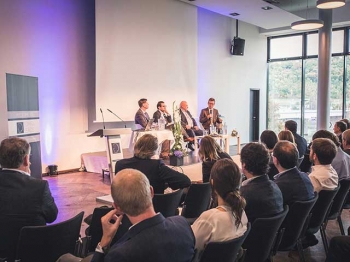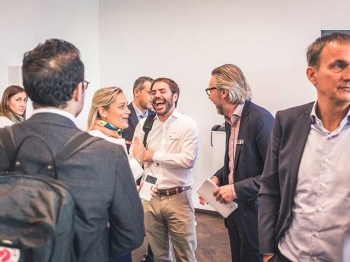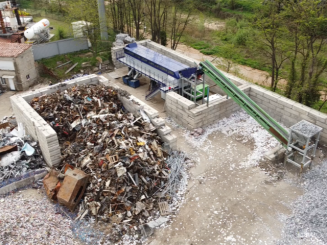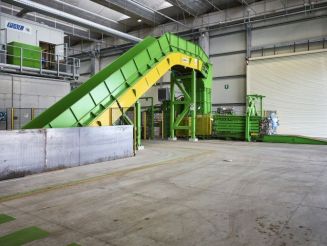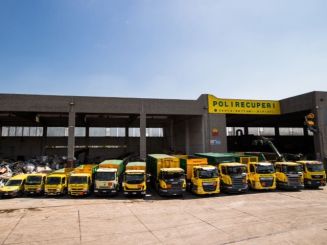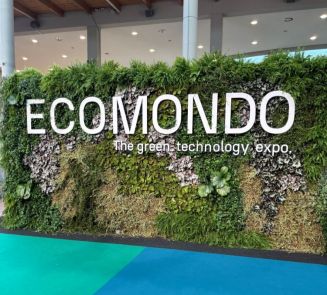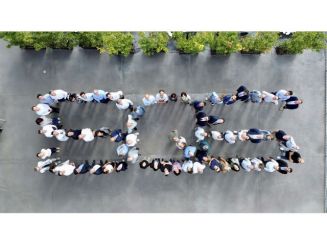
Tomra Sorting Recycling hosts global conference to share insights into the industry’s future challenges
Two-day event brings together industry experts, customers and media to examine ideas for the future and groundbreaking technologies for today.
TOMRA Sorting Recycling hosted a global conference on October 10th and 11th to share insights from leading experts in recycling and waste management and to demonstrate the company’s breakthroughs in sensor-based sorting machines. With the theme ‘Future Perspectives in Recycling,’ the two-day event in Germany featured a series of presentations and group discussions at the Rhein-Mosel Congress Centre in Koblenz and technical demonstrations in TOMRA’s Test Center at its European headquarters in Koblenz. Participants comprised an international mix of industry leaders, business representatives, and members of the specialist media.
Tom Eng, Senior Vice President and Head of TOMRA Sorting Solutions, Recycling, commented: “By bringing together some of the world’s most knowledgeable experts in recycling and waste management, this conference stimulated a fantastic exchange of ideas. Delegates gained new insights into everything from high-level environmental ideals to nitty-gritty technical practicalities. We are delighted to have received so much strong positive feedback, with many participants telling us they found the event informative and inspirational. It’s exciting for all of us to be at the heart of an industry heading towards an inventive and environmentally-important future.”
A popular highlight of the congress was the series of presentations and question-and-answer sessions focusing on the circular economy - of particular interest at a time when the environmental responsibility of retail brands is having an increasing influence on consumers’ purchasing decisions. Helga Vanthournout, Senior Expert at the McKinsey Center for Business and Environment, talked about the circular economy’s impacts on business; George Kremlis of the European Commission’s Directorate-General for the Environment gave a presentation on an EU action plan for the circular economy; and Tom Eng shared advice on achieving readiness for the circular economy.
Congress visitors also welcomed the opportunity to see two notable technical innovations in action at TOMRA´s Test Center: the new AUTOSORT LASER has made it possible to separate thin, thick or opaque glass from Municipal Solid Waste (MSW), to help reduce landfill costs and create additional revenue through the recovery of saleable products; and delegates were given an exclusive preview of AUTOSORT BLACK, the first machine capable of sorting black plastic packaging materials, which will help meet ever-tightening sorting and recycling quotas. BLACK will be brought to market in early 2018.
Presentations and discussions about the bigger issues of the circular economy were attended by all conference delegates. In addition, visitors also separated into two groups - one with a focus on waste, the other with a focus on metal - to attend demonstrations looking at the future challenges facing their particular specializations. (Details of all speakers can be found at the end of this article.)
New solutions for sorting glass and black plastic packaging from MSW
One of the two most significant technical innovations demonstrated in the Test Center, the AUTOSORT LASER, is a sensor-based sorting machine utilizing laser technology. Congress visitors were shown how LASER’s near-infrared (NIR) laser sorting technology ensures sorting stability and makes it possible to separate glass from transparent polymers, which are increasingly used in items such as syringes, lighters, and baby and cosmetic bottles.
The other significant technical innovation, the combined use of the AUTOSORT and AUTOSORT BLACK machines, has made it possible to recover valuable black polymers from packaging materials. Whereas sensor-based sorting technology based on NIR detection is unable to detect or differentiate between black plastics, the BLACK plastic sorter can sort differing polymers such as black PE, black PP, black PET, and styrene. To enable this process, the AUTOSORT machine first recovers the valuable black plastic materials, which are normally part of residue streams, to create a black single stream.
Another plastics recycling machine, the AUTOSORT FLAKE, was also demonstrated in the Test Center. By combining color detection and enhanced material information to sort by color and material at the same time, this has brought new standards of high-precision sorting to a market which increasingly demands high-grade outputs with rPET (recycled polyethylene terephthalate) plastics. FLAKE, like LASER, deploys TOMRA’s patented FLYING BEAM technology combined with the FOURLINE technology, which has the highest resolution NIR (close to 1mm) available on the sorting market.
Increasing the profitability of metal sorting
Looking at metal sorting, demonstrations of the X-TRACT and COMBISENSE machines illustrated how combined sensor-based technologies make the sorting and subsequent sale of zorba (shredded nonferrous scrap metals) more profitable. By passing zorba through an X-Ray Transmission unit to separate aluminum from heavy metals, X-TRACT works with such high precision that it can achieve aluminum purities of 98-99%. From the remaining heavy metals, COMBISENSE then sorts out valuable fragments of copper, brass and grey metals.
In another Test Center demonstration, TOMRA explained its enhanced LIBS (laser-induced breakdown spectroscopy) sorting technology. By employing a laser, which can monitor the entire width of the belt, this has the unique advantage of eliminating the complex and costly need to separate materials into single lanes. This enables the sorting and separation of different aluminum wrought alloys with unprecedentedly high levels of efficiency, achieving sorting accuracies of 99% purity (or greater) with high throughputs of three to seven tons per hour.
Service is equally important
To achieve sustainability aims, the circular economy will depend not only on ultra-efficient recycling machines, but also the businesses and people who produce and maintain them. This was the subject of a presentation by Peter Geisler, Service Director Recycling, titled ‘Minimizing downtimes, maximizing profit - it’s all about the service.’ Recognition of the importance of customer support is evident in TOMRA Care, a comprehensive package of services designed to ensure customers experience a tailored service that enables them to achieve maximum return on investment. TOMRA Care covers process consulting, system testing, financing, insurance, staff training, and upgrades.
Networking opportunities were a conference bonus
To allow conference delegates some relaxation time, and to provide commercially valuable networking opportunities, the two-day event also featured an OcTOMRAfest-themed lunch, sight-seeing tour of Koblenz, Network Flying Dinner at the city’s grand 18th century Electoral Palace, and a dinner cruise on the Rhine River.
PANEL SPEAKERS
In the discussion sessions on waste:
- Antonio Furfari, Managing Director of Plastics Recyclers Europe, gave a presentation on plastics in the circular economy
- Kjell Fredriksen, Senior Consultant at Mepex Consulting, looked at the future of waste (MSW) sorting
- Brian Taylor, Editor of Recycling Today, was moderator of a panel discussion on the future challenges of waste recycling. In two TOMRA Talks
- Jürgen Priesters, TOMRA Sorting Business Development Director, looked at why quality matters in plastic recycling sorting technology, feedstock and costs
- Laszlo Szekely, TOMRA Sorting Business Development Engineer, talked about glass sorting from MSW
In the parallel discussion sessions on metals:
- Maarten Labberton, Director Packaging Group at European Aluminum, looked at the challenges and potential for aluminum packaging recycling
- Prof. Geoff Scamans, Chief Scientific Officer at Innoval Technology, explained how recycling is the future for aluminum in cars
- Richard Barrett, Editor of Metal Bulletin Magazine, was moderator of a panel discussion on future challenges in metal recycling
- Frank van de Winkel, TOMRA Sorting BD Manager, Metal talked about automated sorting of aluminum production scrap by Laser Induced Breakdown Spectroscopy (LIBS)
- Tom Jansen, TOMRA Sorting Sales Manager spoke about the latest trends in ELV post-shredder technologies









